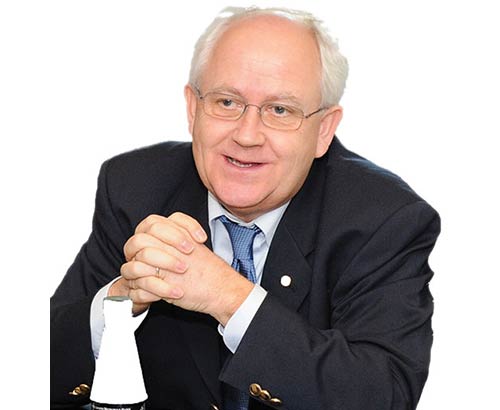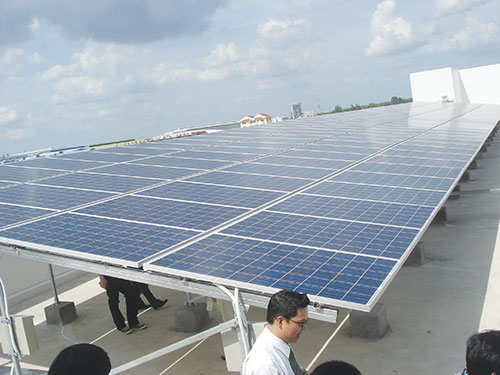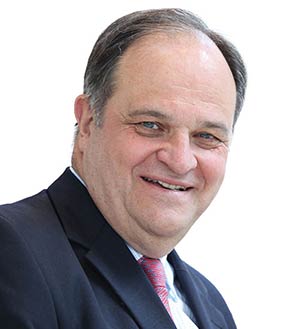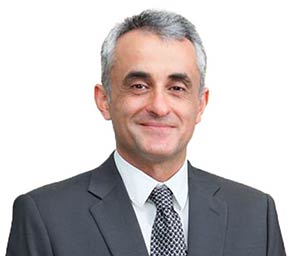Euro chairman talks up green tech

Chairman of EuroCham, Preben Hjortlund told VIR about Vietnam’s target to reach sustainable development as well as EU firms’ opportunities and challenges in contributing to a greener Vietnam as highlighted by the Green-Biz event.
Vietnam’s sustainable development goal is to become an industrialised country by 2020. What are your ideas on the government’s action plans to achieve this important goal?
Most important is a long-term view. Sustainable development and green growth are best achieved with a more time consuming but effective micro-management strategy, such as a cleaner production guideline where existing companies have to continue improving their methods of production and services to have a lower impact on the economy, and which is backed by clear implementation plans.
How can Vietnam balance environmental protection with speedy but stable economic growth?
This is not as much an environmental issue as it is a business one. Businesses and society should recognise the importance of a collective green growth movement and while that may be challenging, it also has the benefit of improving businesses and in the long-term creating a stable growth pattern that facilitates sustainability. I see vast potential in Vietnam in the areas of renewable energy and urban transport solutions, but also the need for energy efficiency and educating workers on its value.

Green-Biz 2013 seeks to promote green business solutions in Vietnam
In your eyes, is renewable energy really drawing EU investors in Vietnam? What do you expect from Green-Biz 2013?
Green Biz 2013 is a chance for key stakeholders to interact, speak with the media about their plans and ideas, and communicate with people about the benefits of green life and business. Vietnam has to find a balance in using its environment, climate and geographic location in a sustainable way. Alongside strong business partnerships, cleantech-foreign direct investment (FDI) and technological support, one lesson from Europe that may help Vietnam is paying close attention to detail and recognising the role that demand-supply forces play in a successful legal framework and development of a power supply for Vietnam’s hundred-million-strong population that is clean and efficient and eventually could be exported to other regional nations.
Technology transfer is both very important and very costly. What will EuroCham and EU firms do to help Vietnam access environmentally friendly technologies?
Let’s get down to the basics. Business partnerships with shared responsibilities, shared profits, and shared expertise are the key to success. An honest and equal relationship is the corner stone of linking with European investors and achieving green growth. Idea incubation and clusters of excellence were the keys to European success where ideas were encouraged and those that showed promise found their way to a place where experts and professionals from different fields could add their insights, experience, and expertise to foster those ideas and make them grow. If Vietnam is anything like Europe, this process creates a growing economy and great socio-economic balance.
When is the next Green-Biz event and how will the next one be different?
Green-Biz 2015 will take place again in Ho Chi Minh City and topics will be similar to this year with emphases on developments since the last event and challenges in the present and future.
Henri-Thierry Noirhomme, country president of Alstom in Vietnam Operating in Vietnam since the early ‘90s with offices in both Hanoi and Ho Chi Minh City, Alstom works in the fields of power generation and transmission, as well as rail infrastructure. It has played a key role in the power and transportation markets since its inception. With our global experience and local presence, we understand the needs of Vietnam and based on this we design, produce, and offer innovative technologies that help local companies produce cleaner energy while getting maximum value out of every investment. We work in both thermal and renewable energy and are dedicated to helping our customers get access to energy anywhere in the world and deliver it at a reliable, sustainable price. |
Xavier DENOLY, country president, Schneider Electric Vietnam & Cambodia At Green-Biz 2013, we would like to communicate to the business community through our energy efficient approach, which allows us to build an efficient economy over the long term. Confronting the energy dilemma by using energy more efficiently has many advantages. First of all, energy efficiency reduces greenhouse gases. Through a combination of different energy efficiency actions, up to 30 per cent efficiency can be achieved immediately. Secondly, energy efficiency projects are low risk, high return investments. Thirdly, energy efficiency is the cleanest and quickest solution to the energy dilemma. Cleanest because the greenest unit of energy is the energy you do not use. Quickest because with solutions that are available today, you can save up to 30 per cent. Based on the fact that 72 per cent of energy consumption comes from industry, residences and tertiary buildings, Schneider Electric decided to showcase energy management solutions at our booth. Specifically we introduced substation automation systems - PACis system, Building management systems and lighting control, energy management and professional services (Solar Energy Management System). We will also provide on-site energy management consulting and demonstrations. Vietnam has many opportunities to develop energy efficient solutions. This is vital in developing clean and green renewable energies like wind and solar power to gradually replace oil and coal. Biological energy is also an alternative in which the Government has shown interest. Is it surprising to know that up to 4.000kWh a year can be created from each square meter of roof that receives direct sunlight on cloudless days? It’s a remarkable number, isn’t it? |
What the stars mean:
★ Poor ★ ★ Promising ★★★ Good ★★★★ Very good ★★★★★ Exceptional
Latest News
More News
- Foreign fruits flood Vietnamese market (December 09, 2025 | 13:22)
- Vietnam’s fruit and vegetable exports reach $7.8 billion in first 11 months (December 05, 2025 | 13:50)
- Vietnam shapes next-generation carbon market (November 26, 2025 | 15:33)
- PM urges Ho Chi Minh City to innovate and remain Vietnam’s economic locomotive (November 26, 2025 | 15:29)
- Experts chart Vietnam's digital finance path: high hopes, high stakes (November 14, 2025 | 10:56)
- Vietnam’s seafood imports surge 30 per cent in first 10 months (November 10, 2025 | 19:35)
- Vietnam’s durian exports hit $1 billion milestone (October 30, 2025 | 17:41)
- Beyond borders: Sunhouse and new era of Vietnamese brands on Amazon (October 28, 2025 | 10:46)
- Record-breaking trade fair set to open in Hanoi (October 15, 2025 | 15:59)
- Timber sector seeks solutions to VAT refunds (October 14, 2025 | 18:58)

 Vietnam’s electricity demand has grown at twice the rate of GDP over the past 10 years and is expected to do so for the next decade. The government is paying close attention to green growth and investment in the energy sector. It has adopted the Green Growth Strategy, which aims to reduce emissions by 8-10 per cent in 2012 against 2010.
Vietnam’s electricity demand has grown at twice the rate of GDP over the past 10 years and is expected to do so for the next decade. The government is paying close attention to green growth and investment in the energy sector. It has adopted the Green Growth Strategy, which aims to reduce emissions by 8-10 per cent in 2012 against 2010. As a global energy management specialist, Schneider Electric does not produce energy and we do not manufacture products that consume energy, however we provide our customers with the ability to make energy safe, reliable, efficient, productive and green, solving their challenges across the network.
As a global energy management specialist, Schneider Electric does not produce energy and we do not manufacture products that consume energy, however we provide our customers with the ability to make energy safe, reliable, efficient, productive and green, solving their challenges across the network.














 Mobile Version
Mobile Version